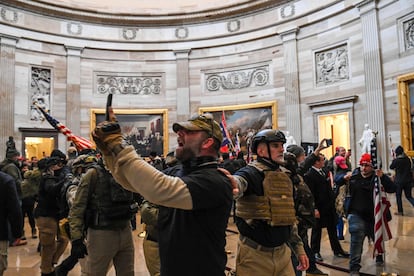War games
The Capitol assailants did not think they had come to destroy democracy. They had come to save it in a mixed reality game called Make America Great Again

One aspect of the Capitol assault that has always interested me is the fact that it was documented by the assailants themselves, on social media in real time. It’s not exactly usual for the criminals themselves to provide documentation. The ecosystem of technologies they used to prepare, mobilize and communicate during the days following the 2020 election would have provided a three-dimensional portrait of the movement before and during the assault, without requiring their consent or collaboration: their forum posts, geo-positioning data, point cards at stores and gas stations. Their shared photos and cameos under surveillance cameras connected to facial recognition systems. Operating unwittingly at the intersection between a fundamentally extractive technology industry and a national security-sensitive context, they left a huge trail of breadcrumbs that made it much easier to quickly identify the assailants. But the truly criminal acts are those recorded in their own documentation.
The armed mob that stormed the Capitol three years ago with the intention of reversing an election result through violence spent much of the assault recording videos, images, and messages and uploading them to social media. Many live-streamed or recorded themselves engaging in acts of vandalism, trespass and violence. They did so not because they thought the assault would be so successful that they would never be convicted for their actions. They made sure to leave irrefutable proof of their participation in the ruckus because, in their minds, they were not part of a seditious conspiracy to overthrow the government. Hours earlier, then-president Donald Trump had told them: “If you don’t fight like hell, you will no longer have a country.” Then he told them, “We love you. You are very special.” When, days later, the authorities arrived at their front doors, they could not quite comprehend it. In their minds, they had not come to destroy democracy. They had come to save it in a mixed reality game called Make America Great Again. Until then, nothing seemed quite real.
“People adopt these digital identities because they are a more perfected version of themselves and can do things they can’t do in the real world,” Steve Bannon tells Errol Morris in the documentary American Dharma, released in 2018. It’s something he learned by speculating on the virtual black market of the massive online video game industry. He then talks about My Darling Clementine, John Ford’s film about the gunfight at the O.K. Corral, and tells him “it’s an idealized version of the American West. That’s what these digital communities offer.” By communities, he means the comment system on his Breitbart page and the American far-right social network where three years later the insurrection was brewing. And the idealized version of the Wild West is the mixed reality game where racism is patriotism, murder is justice, and insurrection is a heroic battle to protect the Constitution and freedom. As J. G. Ballard used to say, sooner or later all games become serious. The question is how long we will continue to play their game, which show the same desperate lack of imagination.
Sign up for our weekly newsletter to get more English-language news coverage from EL PAÍS USA Edition
Tu suscripción se está usando en otro dispositivo
¿Quieres añadir otro usuario a tu suscripción?
Si continúas leyendo en este dispositivo, no se podrá leer en el otro.
FlechaTu suscripción se está usando en otro dispositivo y solo puedes acceder a EL PAÍS desde un dispositivo a la vez.
Si quieres compartir tu cuenta, cambia tu suscripción a la modalidad Premium, así podrás añadir otro usuario. Cada uno accederá con su propia cuenta de email, lo que os permitirá personalizar vuestra experiencia en EL PAÍS.
¿Tienes una suscripción de empresa? Accede aquí para contratar más cuentas.
En el caso de no saber quién está usando tu cuenta, te recomendamos cambiar tu contraseña aquí.
Si decides continuar compartiendo tu cuenta, este mensaje se mostrará en tu dispositivo y en el de la otra persona que está usando tu cuenta de forma indefinida, afectando a tu experiencia de lectura. Puedes consultar aquí los términos y condiciones de la suscripción digital.









































